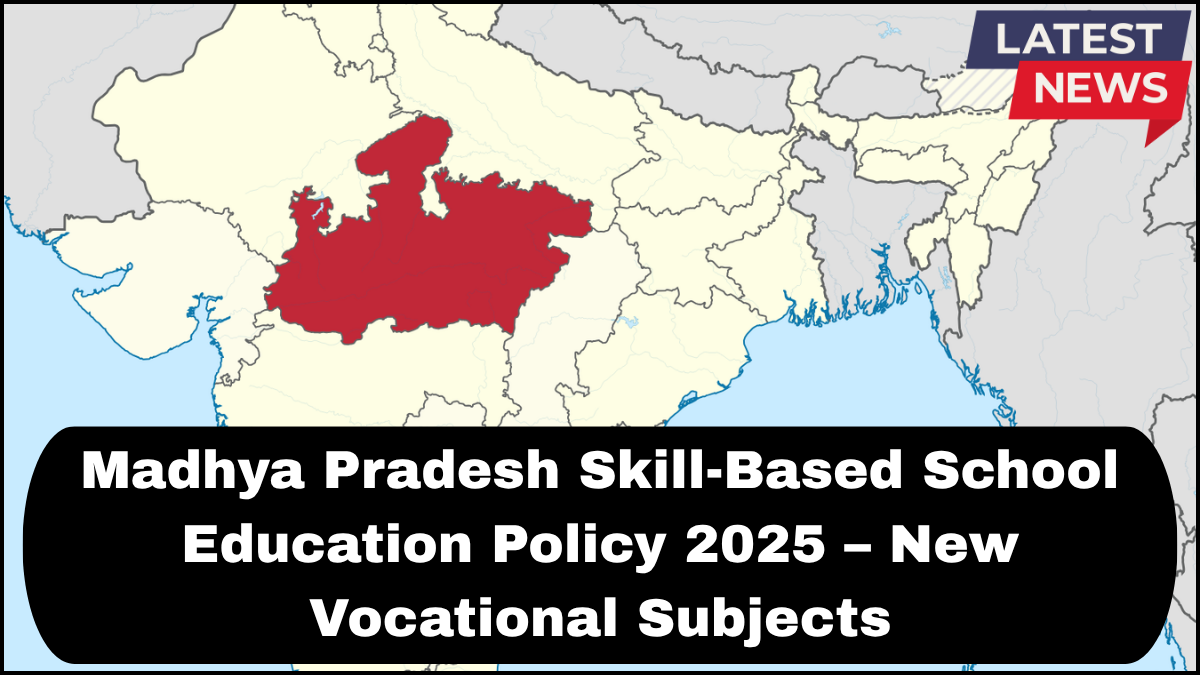Madhya Pradesh is making a strategic shift in its education system with the launch of the Madhya Pradesh Skill-Based School Education Policy 2025. This bold policy aims to integrate skill development directly into the school curriculum, bridging the gap between academic learning and real-world employability. With a strong focus on introducing vocational training in schools, the initiative promises to reshape how students in the state prepare for life after graduation.

A New Era in School Education
The 2025 policy underscores a fundamental shift: moving from rote learning to competency-based education. It aligns with the National Education Policy (NEP) 2020 but goes a step further by making vocational subjects a core part of the curriculum from an early stage.
Students from Grade 6 onwards will now have access to vocational modules alongside traditional subjects. These modules aim to foster hands-on experience, practical thinking, and real-world skills.
Key Objectives of the Policy
- Enhance employability: Equip students with relevant skills for emerging industries.
- Reduce dropout rates: Make education more engaging and career-relevant.
- Bridge urban-rural divide: Ensure access to skill-based education across all districts.
- Create a skilled workforce: Align school education with state economic needs.
Introduction of New Vocational Subjects
Madhya Pradesh will roll out a diverse set of vocational subjects across different clusters, designed in consultation with industry partners, training institutions, and educational experts. Key areas include:
1. Agritech and Sustainable Farming
With a large rural population, the policy promotes smart farming, organic agriculture, and food processing. Students will gain exposure to new technologies like drone monitoring, vertical farming, and soil testing.
2. Healthcare and Allied Services
Recognizing the growing demand in health services, this track includes nursing assistance, medical lab techniques, and elderly care skills.
3. Information Technology and AI
Students can now learn coding, data management, cybersecurity basics, and artificial intelligence applications. These digital skills are aimed at preparing students for the tech-driven future.
4. Retail and E-commerce Operations
With the rise of digital commerce, students will study inventory management, customer service, and digital marketing strategies relevant to both small businesses and large platforms.
5. Green Energy and Environmental Management
Renewable energy, water conservation, and waste management are new additions. These areas not only support sustainability but also open up jobs in the green economy.
Teacher Training and Infrastructure Support
To ensure the success of the Madhya Pradesh skill education policy, the government is investing in teacher upskilling, digital content, and lab-based infrastructure in schools. Teachers will undergo specialized training in their chosen vocational subjects, with support from NSDC (National Skill Development Corporation) and industry mentors.
Industry Linkages and Apprenticeships
One of the policy’s strongest elements is its collaboration with local industries. Students will be provided internship and apprenticeship opportunities, offering early exposure to the work environment. Tie-ups with MSMEs, startups, and sector-specific councils will make learning more relevant and application-based.
Assessment and Certification
The state will follow a continuous assessment model, supported by standardized skill tests. Certifications will be co-issued by the education department and recognized national skill bodies, ensuring credibility and portability across institutions and job markets.
Digital and Remote Learning Support
To ensure inclusivity, vocational content will be made available through e-learning platforms. Remote areas will be supported through mobile labs, community workshops, and local skill hubs, ensuring that no student is left behind due to geographical constraints.
Impact on Students and the Economy
The long-term vision of the Madhya Pradesh Skill-Based School Education Policy 2025 is to produce a generation of self-reliant, skilled youth. By embedding vocational training in schools, the state aims to reduce unemployment, boost entrepreneurship, and create a dynamic, future-ready workforce that aligns with India’s evolving economy.
FAQs
Q1: What is the Madhya Pradesh Skill-Based School Education Policy 2025?
The policy is a state-led initiative to integrate skill-based learning into school curricula, introducing vocational subjects from Class 6 onwards to boost employability and practical knowledge.
Q2: What vocational subjects are offered under the policy?
Subjects include agritech, healthcare, IT, e-commerce, and green energy, among others. These areas have been selected based on industry demand and future employment trends.
Q3: Will vocational training be compulsory for students?
While not mandatory for all grades, vocational modules will be offered as electives with the option to specialize in higher classes.
Q4: How will students benefit from this policy?
Students gain hands-on experience, certifications, and potential apprenticeship opportunities, making them job-ready and enhancing their higher education prospects.
Q5: What support is available for rural schools?
The government is providing digital tools, mobile labs, and training programs to ensure equal access to vocational training in remote areas.
click here to learn more